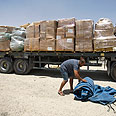
Gaza gets chocolate but no cement as embargo eases
As Israel begins to implement decision to ease siege on Strip following flotilla affair, Palestinians, who want access to building materials, not consumer goods, dissapointed
If you have cash to spare in Gaza, you can treat your children to new varieties of chocolate Israel has just let in for the first time in a few years, or splash out on new tableware it allowed into the territory this week.
If you need cement and steel to rebuild a home destroyed by war, you'll have to wait a bit longer.
Israel is still deciding exactly what it will and will not allow into Gaza under a new approach towards the enclave, which it has blockaded for four years. As it changes the policy, some previously banned goods have started to flow across the border.
As yet, there is no sign of the basic materials and machine parts which aid workers and businessmen say Gaza needs if the homeless are to be re-housed and the economy is to be revived to alleviate growing poverty attributed to the blockade.
Facing an international outcry over its lethal raid on a Turkish ship that tried to break the embargo last month, Israel announced on June 20 that it would ease the blockade.
The steps taken by Israel so far have disappointed Palestinians who want ready access to materials such as cement, not consumer goods which are plentiful for the few with spare cash.
Over the past two weeks, the easing of the embargo has allowed grocers to fill their shelves with cornflakes, cakes, biscuits, shampoo and razor blades supplied through the Kerem Shalom crossing to Gaza.
Consumer goods not needed
Like most items, these goods were available, if expensive, from black marketeers who have been filling the supply gap by bringing in merchandise through tunnels from Egypt, Gaza's main supply route for the past two years.
"The market cannot absorb this," said grocery store owner Emad al-Buzm, as he turned away boxes of vacuum-wrapped cakes that had just arrived from Israel.
"The country needs materials that employ people: Cement, metal, raw materials for the factories," he said, alluding to the economic hardship in Gaza.
The United Nations' agency UNRWA which cares for Palestinian refugees says 80% of the population now depends on its food aid, compared with 40% a few years ago.
Palestinian officials say washing machines, refrigerators and bathroom fittings are expected in the next few days.
Blacklist awaited
Traders who have been bringing goods through the tunnels have cut their sales forecasts, anticipating that Israel's new policy will undermine the tunnel trade.
Fearing a drop in demand for the Egyptian-made televisions he has been selling, electrical goods store owner Abu Khaled ordered just a quarter of his usual stock in June.
"I am bringing in a limited amount because I'm worried prices will fall," he said.
Like other goods, cement and steel are available through the tunnels, but not at prices that make them affordable to Palestinians who need to rebuild their homes.
The prospects of Israel allowing such materials to flow freely to Gaza in the near future appear slim.
Israel has defined such construction materials as "dual use", meaning militants can use them for military purposes such as building bunkers and rockets to fire into Israel.
Under its previous policy, Israel banned all but a list of permitted goods. Now, it is preparing to allow in everything except arms and "problematic dual use" materials. A list of the items has yet to be published.
However, it has said it will "enable and expand the inflow of dual-use construction materials" for projects under international supervision, highlighting the example of a UN scheme to build 150 homes in the southern Gaza Strip.
If it can get the materials it needs, UNRWA says it can immediately start work on construction projects throughout Gaza.
"We have the infrastructure, we have the engineers, we have maps, we have everything. We just don't have cement and iron," said UNRWA spokesman Adnan Abu Hasna.
"Ketchup and mayonnaise will not have any real effect," he said, referring to two of the food items recently allowed through Kerem Shalom into Gaza. "We need hundreds of thousands of tons of cement and iron."
- Follow Ynetnews on Facebook










